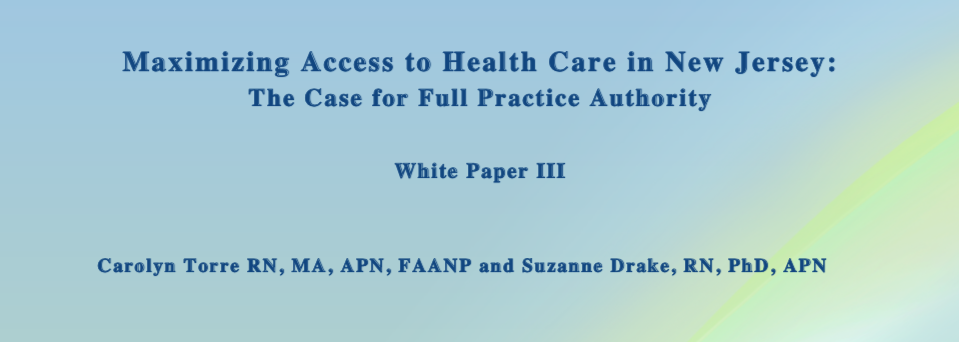

APN-NJ (Advanced Practice Nurses of New Jersey)
is a Grassroots advocacy coalition of APNs, nurses and citizens in concert with our state nursing organization who are committed to improving healthcare in the state by removing scope of practice barriers. APNs are a solution to the healthcare access crisis.
Upcoming events
Pharmacies and Insurance Companies Refusing to Honor APNs Scripts
without a collaborating physician's name on the prescription:
If you run into this problem while the EO#112 waiver is still in place,
please download and send, hand deliver or have your patient bring to the pharmacy the following letter ![]() while we continue to work on this.
while we continue to work on this.
You may also use and share this link NJDCU to stay up to date.
Updates
Public Health Emergency Ended
State of Emergency Continues
May 4, 2023 While New Jersey's public health emergency was terminated in 2021, the general state of emergency related to COVID-19 that was first declared on March 9, 2020 remains in effect.
From the Governor’s office:
"The public health emergency was ended, but the state of emergency, however, remained – and continues to remain – in effect pursuant to EO 103 and EO 292.
Our state regulatory actions, rule waivers, and directives from state departments are tied to the state of emergency, and therefore, in most instances, will not automatically expire with the expiration of the federal public health emergency.
However, the Governor’s Office is in the process of evaluating the status of all our state COVID-19-related policies, including how they will be impacted by the federal government’s ending of the federal public health emergency".
Temporary waiver for the requirement for APN Joint Protocol and supervisory requirements for APNs-A, continues to be in place, until Gov. permanently ends them or it is made permanent by law.
Rules that require Advanced Practice Nurses licensed in New Jersey to maintain a collaborative agreement with a New Jersey physician in order to prescribe or order medications or devices are still waived concurrent with the end of state of emergency. (Mar 2024)
Job-Ops and Happenings
Announcements
Effective Treatments for Opioid Addiction:
Recovery Is Possible!
IMPORTANT!Misinformation is being distributed by NJ Physician Groups to NJ Legislators re: APN practice and FPA.Please READNurse Practitioners and Advanced Practice Nurses of NJ need your support to assure access to care in NJ.
|
Opioid Abuse Prevention
New Jersey is confronting a staggering public health crisis brought about by prescription opioid abuse. On February 15, 2017, P.L. 2017, c. 28, was signed into law, imposing certain restrictions on how opioids and other Schedule II controlled dangerous substances may be prescribed. In response to the new law, the Attorney General and New Jersey's prescribing boards adopted new rules designed to reduce the risk of addiction and the accumulation of opioids in the household medicine cabinets across the State, which are very often diverted for illegal use. Information about those rules, as well as guidance for prescribers and patients on safer pain medication prescribing practices is available here.
FREQUENTLY ASKED QUESTIONS For Advance Practice Nurses Licensed by the Board of Nursing. State law makes it unlawful for a prescriber to issue an initial prescription for acute pain for more than a five-day supply. In addition, the dosage authorized by initial prescriptions for acute pain is to be limited to the lowest effective dose of an immediate–release opioid drug. To better understand how to comply with this limitation and other rule changes, the Board offers the following guidance.
Fin
Find Out MoreRules and regulations of the Division of Consumer Affairs, the boards and committees in, and other units of, the Division are codified in Title 13 of the New Jersey Administrative Code, published by LexisNexis. Notices of proposal and notices of adoption are printed in the New Jersey Register, also published by LexisNexis.
The official text of the rules and regulations and their regulatory history and notices of rule proposals and adoptions can be found through the free LexisNexis Public Access Portal.
|





